Unit 3 Language in use
文档属性
| 名称 | Unit 3 Language in use | 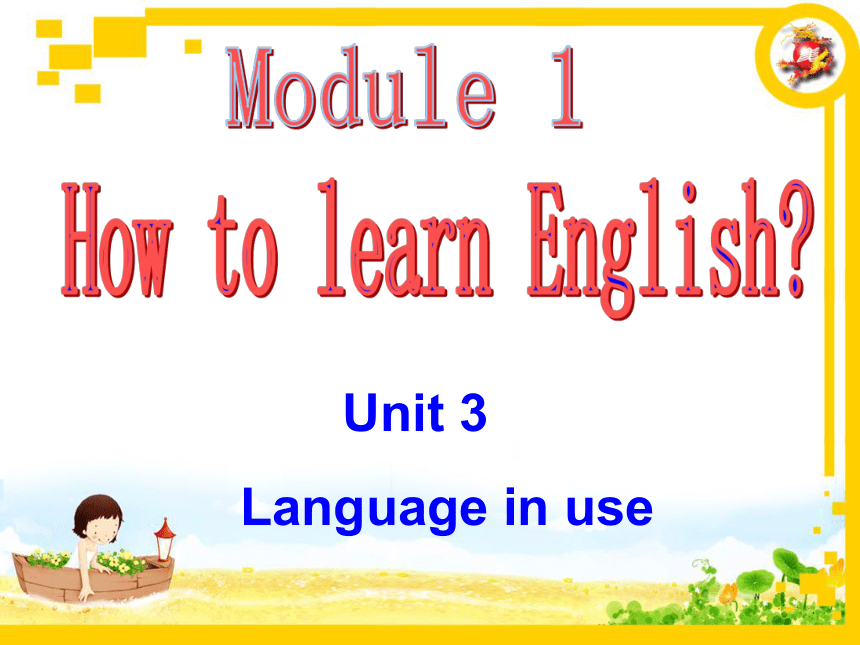 | |
| 格式 | zip | ||
| 文件大小 | 6.3MB | ||
| 资源类型 | 教案 | ||
| 版本资源 | 外研版 | ||
| 科目 | 英语 | ||
| 更新时间 | 2013-09-01 08:04:07 | ||
图片预览

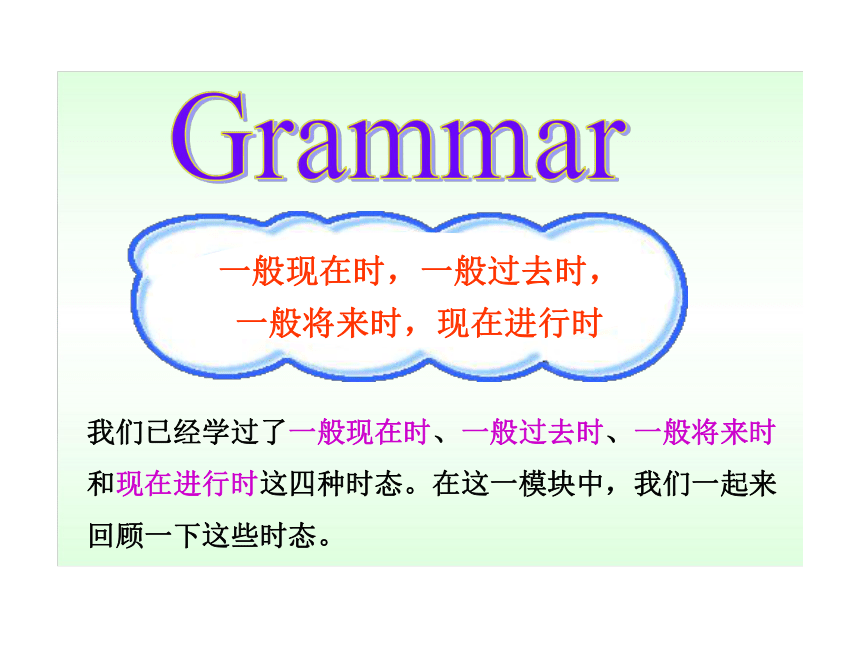

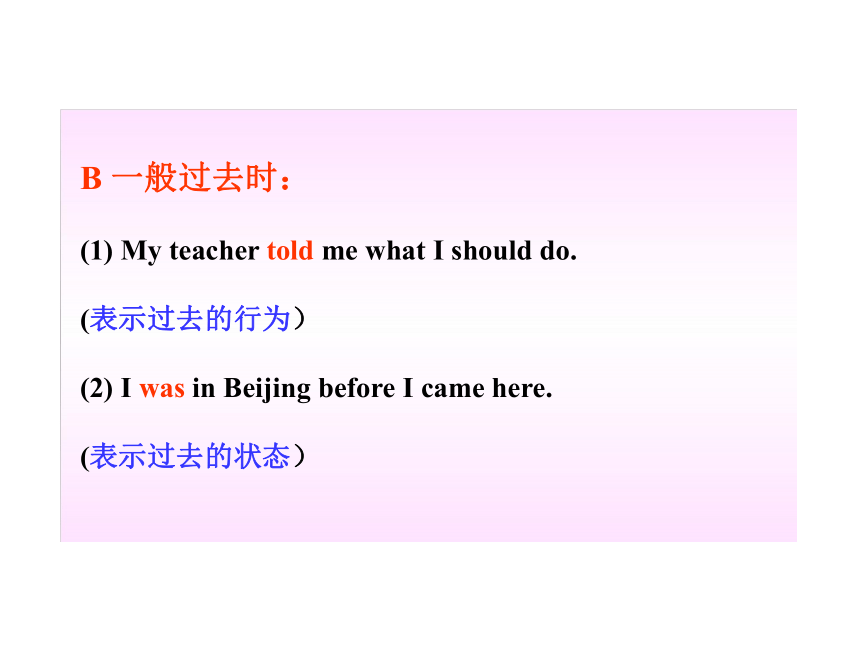
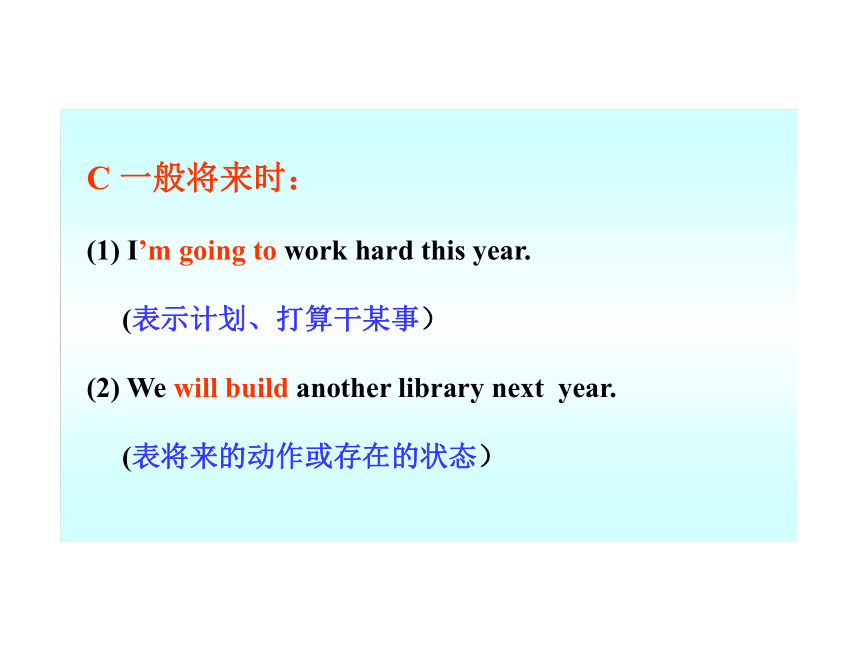
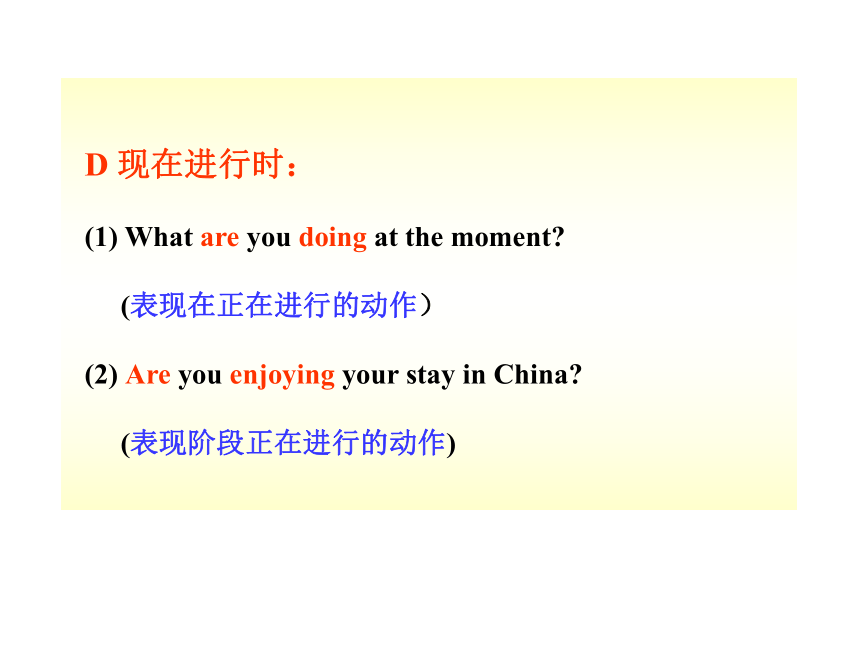
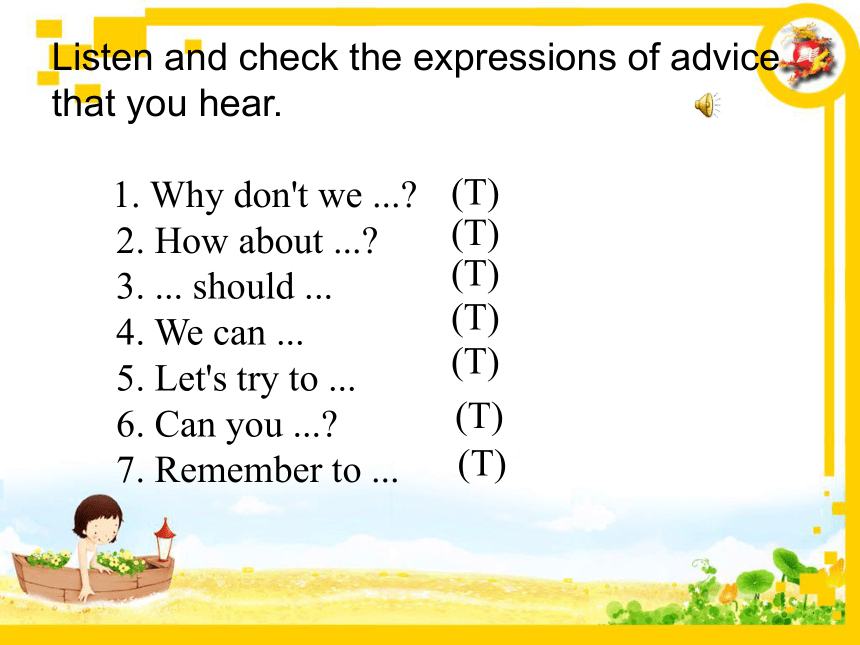
文档简介
课件19张PPT。How to learn English?Module 1 Unit 3
Language in useGrammar我们已经学过了一般现在时、一般过去时、一般将来时和现在进行时这四种时态。在这一模块中,我们一起来回顾一下这些时态。一般现在时,一般过去时, 一般将来时,现在进行时A 一般现在时:
(1) I always go to school by bike.
(表示经常性的行为)
(2) Mary likes watching English films.
(表示目前的爱好)
(3) I want to remember all the new words.
(表示意愿)
(4) Lily is shy. She can’t speak in front of the class.
(表状态)
(5) The earth goes around the sun. (表真理) B 一般过去时:
(1) My teacher told me what I should do.
(表示过去的行为)
(2) I was in Beijing before I came here.
(表示过去的状态) C 一般将来时:
(1) I’m going to work hard this year.
(表示计划、打算干某事)
(2) We will build another library next year.
(表将来的动作或存在的状态) D 现在进行时:
(1) What are you doing at the moment?
(表现在正在进行的动作)
(2) Are you enjoying your stay in China?
(表现阶段正在进行的动作)Listen and check the expressions of advice that you hear. 1. Why don't we ...?
2. How about ...?
3. ... should ...
4. We can ...
5. Let's try to ...
6. Can you ...?
7. Remember to ... (T)(T)(T)(T)(T)(T)(T)Listen again and answer the questions. 1. What is difficult for Charlie?
2. How will Mary help him?
3. When does Charlie think they should meet?
4. When does Mary think about reading newspapers?Possible answers:1. He's finding his English homework difficult.2. She offers to work with him3. After school that day.4. ? Work in pairs.Look at the pictures and say what Jack usually does.
Jack goes to bed late.go to bed/late get up/late He gets up late.Advice:He should go to bed before nine o'clock. Advice:He should get
up early.
listen/teacher/carefully
not use/dictionaryHe listens to teacher
carefully.He doesn't use dictionary. Advice:He should use a dictionary to find the meaning of new words.
read/ English newspaper
write/words/notebookHe reads English newspaper.He writes down words in the notebook.Read the letter, find out Helen’s problem. And then choose the right words to finish the advice. 1. Find out Helen’s problem:Hi,Diana,
I like English very much. My reading is good, but my speaking is poor.How can I improve my speaking?
Best,
Helen2. Finish the advice:how about should try to why don’t why notHello ,Helen,
You need to practise speaking more often. (1)_________ you look for some English-speaking people in your town? (2) _________ saying hello to them and asking them where they come from? (3) __________make friends with them and show them around your town.
Is there an English club in your town? If there Why don’tHow aboutTry to According to the letter and the advice, and then say “Yes or No”.1. Helen doesn’t like English.2. Helen’s reading is very good.( )( )NoYes3. Helen’s speaking English is bad.4. Diana gives some good advice to Helen.5. Diana suggests Helen to find a pen friend.( )( )YesYesNo( )7. Complete the sentences with the words in the box.Helen: How can I _________ my reading?
James:Here is my (2)_________. Choose a newspaper to read. First, think about what's happening today. What will be in the newspaper? Then read the titles of articles and choose one to read for more information. Don't stop to(3)_________ every word. You don't need to know every word to understand the article.Learning only a few words is enough. Try to use them as much as (4)______. Then you won't (5) _________ them easily.improveadvicecheckpossibleforgetis not, (4) ___________start one with your friends? (5)__________playing a few games and listening to some music? You can watch English films together, and (6)__________speak English all the time. You (7) _________invite your new English friends to your club!
Best,
Diana
why nottry toHow aboutshouldLook at the table. These are Tom’s problems, then try your best to give him some advice.Homework:1. Grasp the useful sentences.2. Make an English study plan for yourself
for this year.3. Say what you are /aren’t good at and what
you should do.Goodbye
Language in useGrammar我们已经学过了一般现在时、一般过去时、一般将来时和现在进行时这四种时态。在这一模块中,我们一起来回顾一下这些时态。一般现在时,一般过去时, 一般将来时,现在进行时A 一般现在时:
(1) I always go to school by bike.
(表示经常性的行为)
(2) Mary likes watching English films.
(表示目前的爱好)
(3) I want to remember all the new words.
(表示意愿)
(4) Lily is shy. She can’t speak in front of the class.
(表状态)
(5) The earth goes around the sun. (表真理) B 一般过去时:
(1) My teacher told me what I should do.
(表示过去的行为)
(2) I was in Beijing before I came here.
(表示过去的状态) C 一般将来时:
(1) I’m going to work hard this year.
(表示计划、打算干某事)
(2) We will build another library next year.
(表将来的动作或存在的状态) D 现在进行时:
(1) What are you doing at the moment?
(表现在正在进行的动作)
(2) Are you enjoying your stay in China?
(表现阶段正在进行的动作)Listen and check the expressions of advice that you hear. 1. Why don't we ...?
2. How about ...?
3. ... should ...
4. We can ...
5. Let's try to ...
6. Can you ...?
7. Remember to ... (T)(T)(T)(T)(T)(T)(T)Listen again and answer the questions. 1. What is difficult for Charlie?
2. How will Mary help him?
3. When does Charlie think they should meet?
4. When does Mary think about reading newspapers?Possible answers:1. He's finding his English homework difficult.2. She offers to work with him3. After school that day.4. ? Work in pairs.Look at the pictures and say what Jack usually does.
Jack goes to bed late.go to bed/late get up/late He gets up late.Advice:He should go to bed before nine o'clock. Advice:He should get
up early.
listen/teacher/carefully
not use/dictionaryHe listens to teacher
carefully.He doesn't use dictionary. Advice:He should use a dictionary to find the meaning of new words.
read/ English newspaper
write/words/notebookHe reads English newspaper.He writes down words in the notebook.Read the letter, find out Helen’s problem. And then choose the right words to finish the advice. 1. Find out Helen’s problem:Hi,Diana,
I like English very much. My reading is good, but my speaking is poor.How can I improve my speaking?
Best,
Helen2. Finish the advice:how about should try to why don’t why notHello ,Helen,
You need to practise speaking more often. (1)_________ you look for some English-speaking people in your town? (2) _________ saying hello to them and asking them where they come from? (3) __________make friends with them and show them around your town.
Is there an English club in your town? If there Why don’tHow aboutTry to According to the letter and the advice, and then say “Yes or No”.1. Helen doesn’t like English.2. Helen’s reading is very good.( )( )NoYes3. Helen’s speaking English is bad.4. Diana gives some good advice to Helen.5. Diana suggests Helen to find a pen friend.( )( )YesYesNo( )7. Complete the sentences with the words in the box.Helen: How can I _________ my reading?
James:Here is my (2)_________. Choose a newspaper to read. First, think about what's happening today. What will be in the newspaper? Then read the titles of articles and choose one to read for more information. Don't stop to(3)_________ every word. You don't need to know every word to understand the article.Learning only a few words is enough. Try to use them as much as (4)______. Then you won't (5) _________ them easily.improveadvicecheckpossibleforgetis not, (4) ___________start one with your friends? (5)__________playing a few games and listening to some music? You can watch English films together, and (6)__________speak English all the time. You (7) _________invite your new English friends to your club!
Best,
Diana
why nottry toHow aboutshouldLook at the table. These are Tom’s problems, then try your best to give him some advice.Homework:1. Grasp the useful sentences.2. Make an English study plan for yourself
for this year.3. Say what you are /aren’t good at and what
you should do.Goodbye
同课章节目录
- Module 1 How to learn English
- Unit 1 Let's try to speak English as much as possi
- Unit 2 You should smile at her.
- Unit 3 Language in use .
- Module 2 My home town and my country
- Unit 1 It's taller than many other buildings.
- Unit 2 Cambridge is a beautiful city in the east o
- Unit 3 Language in use .
- Module 3 Sports.
- Unit 1 Nothing is more exciting than playing tenni
- Unit 2 This year we training more carefully.
- Unit 3 Language in use .
- Module 4 Planes, ships and trains .
- Unit 1 He lives the farthest from school.
- Unit 2 What is the best way to travel.
- Unit 3 Language in use .
- Module 5 Lao She Teahouse.
- Unit 1 I wanted to see the Beijing Opera.
- Unit 2 It descibes the changes in Chinese society.
- Unit 3 Language in use .
- Module 6 Animals in danger.
- Unit 1 It allows people to get closer to them .
- Unit 2 The WWF is working hard to save them all.
- Unit 3 Language in use .
- Revision module A
- Module 7 A famous story
- Unit 1 Alice was sitting with her sister by the ri
- Unit 2 She was thinking about her cat.
- Unit 3 Language in use .
- Module 8 Accidents
- Unit 1 While the car were changing to red, a car s
- Unit 2 I was trying to pick it up when it bite me
- Unit 3 Language in use .
- Module 9 Population
- Unit 1 The population of China is about 1.37 billi
- Unit 2 Arnwick was a city with 200,000 people.
- Unit 3 Language in use .
- Module 10 The weathe
- Unit 1 It might snow.
- Unit 2 The weather is fine all year round.
- Unit 3 Language in use .
- Module 11 Way of life
- Unit 1 In China ,we open a gift later.
- Unit 2 In England, you usually drink tea with milk
- Unit 3 Language in use .
- Module 12 Help
- Unit 1 What should we do before help arrives?
- Unit 2 Stay away from windows and heavy furniture.
- Unit 3 Language in use .
- Revision module B
